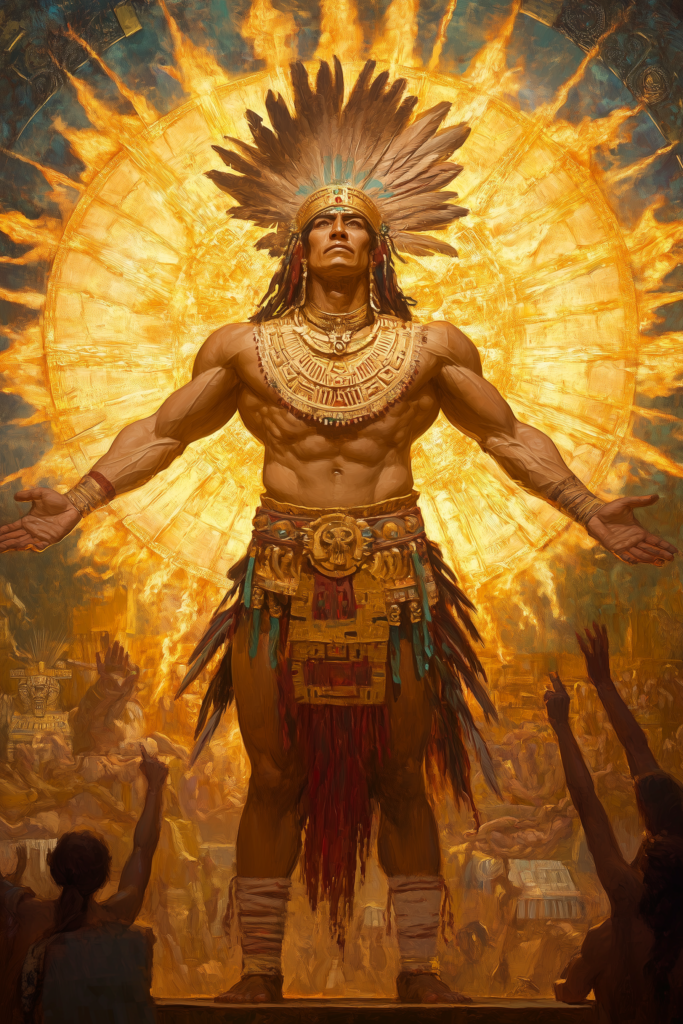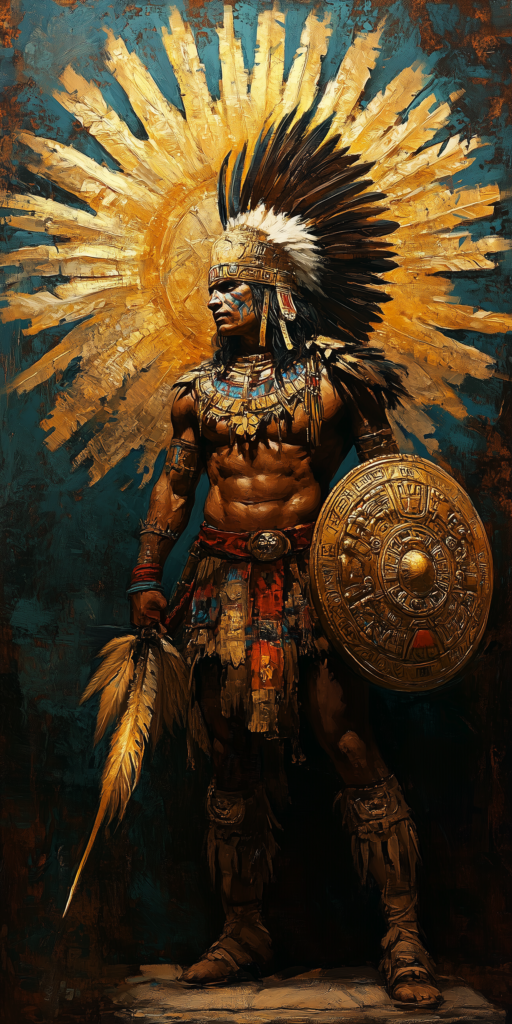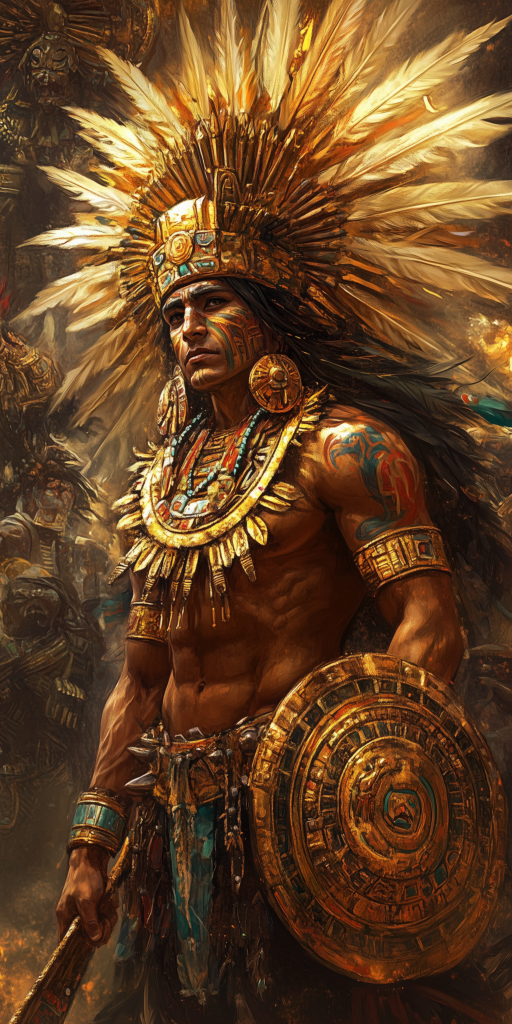Tonatiuh, the Relentless Sun
“Aztec Sun God Tonatiuh demands human hearts to keep the world alive—divine savior or terrifying tyrant?”

- Pantheon: Aztec (Mexica)
- Deity Title: God of the Sun, Ruler of the Fifth Sun, Lord of Warriors
- Deity Symbol: Solar disk, Flaming face, Obsidian sacrificial blade
- Home Plane: The Sky (Ilhuicatl Tonatiuh), The Celestial Realm of the Sun
- Deity Level: Greater Deity
- Alignment: Lawful Neutral (with tendencies toward Lawful Evil due to his demands for sacrifice)
- Aliases: He Who Goes Forth Shining, The Unyielding Fire, Devourer of Hearts
- Superior: Ometeotl (Dual Creator Deity)
- Traditional Allies: Huitzilopochtli (God of War and the Sun in battle), Tezcatlipoca (God of Fate and Conflict), Tlaloc (God of Rain, as both are necessary for life)
- Traditional Foes: Itztlacoliuhqui (God of Frost and Death), Mictlantecuhtli (God of the Underworld), Coyolxauhqui (Moon Goddess, associated with the night’s defiance of the sun)
- Divine Artifact: The Xiuhcoatl (Fire Serpent), a celestial weapon said to burn away those who defy the sun’s will
- Servants: Warrior spirits (Tonatiuh Ilhuicatl, the honored dead who died in battle or sacrifice), Sun Priests, the Eagle and Jaguar Knights
- Servitor Creatures: Fire serpents, Solar eagles, Coyotes of the Dawn
- Sacred Animal: Eagle (symbol of warriors and the rising sun)
- Manifestations: A burning figure with golden skin and fiery eyes, a great solar disk with a face in its center, a warrior crowned in flames
- Signs of Favor: A brilliant sunrise, intense midday heat, victories in battle, an enemy captured alive for sacrifice
- Worshipers: Warriors, Priests, Rulers, Conquerors, Sun Cultists, Farmers (who rely on his strength for growth)
- Cleric Alignments: Lawful Neutral, Lawful Evil, Neutral, Chaotic Neutral (warrior-priests)
- Specialty Priests: Sun Bearers, Heart Takers, Keepers of the Fifth Sun
- Holy Days: Toxcatl (Festival of Renewal and War), Panquetzaliztli (Honoring the Sun and Warriors), Solar Eclipses (viewed as moments of crisis for the sun)
- Portfolio: Sun, War, Sacrifice, Strength, Glory, Fate of the Fifth Sun
- Domains: Sun, War, Fire, Strength, Glory, Destruction
- Favored Weapon: Macuahuitl (Obsidian-edged war club), Spear, Ritual Sacrificial Knife
- Favored Class: Warrior, Cleric, Paladin of War, Blood Mage
- Favored Race: Humans (particularly the Aztecs, his chosen people)
- Duties of the Priesthood: Maintain ritual sacrifices, lead warriors into battle, ensure the sun’s movement through offerings, interpret omens related to the sun’s favor
- Major Cult/Temple Sites: Templo Mayor (Tenochtitlán), Great Sun Pyramids, Warrior Temples across the empire
- Benefits: Divine favor in battle, increased endurance under the sun, visions of fate, fire immunity for the most devoted
- Significant Others: The sacrificed warriors who ascend to his sky realm, the gods who support the Fifth Sun’s survival, and the ever-looming threat of those who seek to end his reign
Tonatiuh is the Aztec god of the sun, ruling over the present cosmic era known as the Fifth Sun. He is a powerful and relentless deity, depicted with a fierce face, a tongue shaped like a sacrificial blade, and surrounded by radiant solar flames. As the force that moves the sun across the sky, Tonatiuh is both revered and feared, embodying the dual nature of life-giving warmth and destructive fire.
The Aztecs believed that without his daily journey, the world would descend into darkness and chaos. However, his path across the sky requires an extraordinary source of energy—human sacrifice. To keep the sun in motion, warriors and captives were offered in ritual ceremonies, their hearts believed to fuel his strength.
Role & Purpose:
Tonatiuh is the divine force behind the sun’s movement, ensuring the continuity of the world. However, this task is not without cost—he demands the blood of warriors and sacrifices to sustain his strength. Without these offerings, the sun would falter, and the world would end in darkness, bringing about the collapse of the Fifth Sun.
He is not a cruel god by nature, but a relentless force driven by the cosmic balance of life and death. His purpose is to sustain the cycle of existence, maintaining the heavens and ensuring the Aztec people thrive under his divine light. Through sacrifice, he grants life, proving that creation and destruction are eternally intertwined.
Tonatiuh, the Eternal Sun

Large Celestial (Deity), Lawful Neutral (with aspects of ruthless necessity)
Challenge: 38 (approx. 200,000 XP)
Armor Class: 30 (natural armor)
Hit Points: 1,500 (120d12 + 600)
Speed: 60 ft., fly 120 ft. (hover)
| STR | DEX | CON | INT | WIS | CHA |
|---|---|---|---|---|---|
| 30 (+10) | 24 (+7) | 28 (+9) | 26 (+8) | 30 (+10) | 32 (+11) |
Saving Throws: Str +18, Dex +15, Con +17, Int +16, Wis +18, Cha +19
Skills: Perception +18, Insight +18, Intimidation +19, Religion +16
Damage Resistances: Fire, Radiant; bludgeoning, piercing, and slashing from nonmagical attacks
Damage Immunities: Necrotic, Poison
Condition Immunities: Charmed, Frightened, Exhaustion, Petrified, Poisoned
Senses: Truesight 120 ft., Passive Perception 28
Languages: All; telepathy 120 ft.
Divine Attributes & Abilities
- Divine Radiance Aura.
A 30‑foot radius of searing, celestial light surrounds Tonatiuh. Any enemy starting its turn within this aura must succeed on a DC 27 Constitution save or suffer 27 (6d8) radiant damage as the burning essence of the Fifth Sun punishes all who dare approach. - Innate Spellcasting (Divine Magic).
Spellcasting Ability: Charisma (spell save DC 27, +19 to hit)
Reflecting his domains of Sun, War, and Sacrifice, Tonatiuh can cast the following spells without material components:- At will: Light, Daylight, Detect Magic, Flame Blade (radiant manifestation)
- 3/day each: Flame Strike, Sunbeam, Fireball (enhanced with solar fury)
- 2/day each: Sunburst, Wall of Fire, Blinding Smite
- 1/day each: Meteor Swarm, Prismatic Wall, Holy Aura, Divine Word
His spells burn with the intensity of the midday sun, and foes often find themselves overwhelmed by a brilliance that scorches both body and spirit.
- Legendary Resistance (3/Day).
If Tonatiuh fails a saving throw, he can choose to succeed instead, ensuring that his cosmic mandate is never thwarted by mortal frailty.
Actions
- Multiattack.
Tonatiuh makes two attacks with his divine weapon, Xiuhcoatl. - Xiuhcoatl, the Fire Serpent (Divine Artifact).
Melee Weapon Attack: +19 to hit, reach 10 ft., one target.
Hit: 50 (8d10 + 10) slashing damage plus 36 (8d8) fire damage.
On a critical hit, the target must succeed on a DC 27 Constitution saving throw or be ignited—suffering an additional 18 (4d8) fire damage at the start of each of its turns until a successful DC 27 Dexterity check extinguishes the flames.
Description: Xiuhcoatl is not merely a weapon; it is the embodiment of solar wrath—a blazing serpent forged in the heart of the Fifth Sun, its obsidian edges and scorching fire an ever-present reminder of sacrifice and survival. - Solar Flare (Recharge 5–6).
Tonatiuh releases a burst of blinding solar energy in a 60‑foot radius centered on himself. Each creature in the area must make a DC 27 Constitution saving throw, taking 45 (10d8) radiant damage on a failure or half as much on a success. Additionally, those who fail are blinded for 1 minute (with repeated saves allowed at the end of each turn to end the condition). - Sacrificial Judgment (Reaction).
When an enemy within 30 feet casts a spell or makes a melee attack against an ally of Tonatiuh, he can invoke divine retribution. The attacker must succeed on a DC 27 Dexterity saving throw or take 27 (6d8) radiant damage as a searing beam of sunlight strikes from above.
Legendary Actions
At the end of other creatures’ turns, Tonatiuh can take 3 legendary actions (regaining spent actions at the start of his turn):
- Radiant Burst.
Make one melee attack with Xiuhcoatl. - Solar Surge (Costs 2 Actions).
Move up to half his flying speed without provoking opportunity attacks. Any creature that ends its movement within his blazing trail must succeed on a DC 27 Dexterity saving throw or suffer 22 (4d10) fire damage. - Blinding Flash (Costs 3 Actions).
Emit a dazzling burst of solar energy. Every creature within 30 feet must succeed on a DC 27 Constitution save or be blinded until the end of its next turn.
Lair Actions
In his celestial temple—a realm where the solar energies converge—Tonatiuh’s presence warps reality itself. On initiative count 20 (losing ties), he can invoke one of the following lair actions:
- Solar Eclipse.
Darkness briefly falls over a 120‑foot radius as the sun’s brilliance is partially obscured. In this zone, all creatures have disadvantage on attack rolls and saving throws until the start of the next round. - Seared Earth.
Concentrated beams of sunlight strike a point within the lair. Each creature within a 20‑foot radius of that point must succeed on a DC 27 Dexterity save or take 27 (6d8) radiant damage. - Fiery Renewal.
The ambient solar energy converges upon Tonatiuh, healing him for 50 hit points as his divine essence is momentarily replenished.
Regional Effects
The region within 6 miles of Tonatiuh’s lair is forever altered by his radiance:
- Daylight Prevails.
Natural light is unnaturally intense. Plants flourish in perpetual growth, while creatures sensitive to bright light may be overwhelmed. - Sun’s Fury.
Hostile creatures beginning their turn within the region take 10 (3d6) radiant damage as the searing heat of the sun punishes all intruders. - Sacred Battlefield.
Battles fought within this region are imbued with divine energy. Allies of Tonatiuh gain advantage on saving throws against fear, while enemies suffer disadvantage on such saves, as the very ground pulses with the energy of sacrifice and survival.
Mythic Resilience
- Fiery Rebirth.
Upon being reduced to 0 hit points, Tonatiuh’s divine essence coalesces into a vortex of pure solar energy. At the start of his next turn, he regains 200 hit points and unleashes a burst of 100 (10d10 + 20) radiant damage to all creatures within 60 feet. This cataclysmic renewal occurs only once per encounter, symbolizing the sun’s relentless return.
Weaknesses
- Total Darkness.
In zones of magical darkness or during a perfect solar eclipse, Tonatiuh’s radiant power is halved. In such conditions, his damage output is reduced by 50%, and his spells are less effective. - Divine Opposition.
When facing deities or creatures whose powers counter the sun—such as frost, shadow, or death entities—Tonatiuh suffers disadvantage on attack rolls and saving throws, as these opposing forces dampen his celestial fury.
Currently in the World

The sky burns with golden fire as Tonatiuh rises once more, his blazing form stretching across the heavens. His face is stern, his eyes unwavering—he knows his purpose. He is no mere observer of the cosmos; he is its heartbeat, its rhythm, its lifeblood. The world moves because he moves, and yet, his journey is never assured. The sun must be fed.
Tonatiuh is not cruel, nor is he merciful. He is necessity. As he ascends, he casts his scorching gaze over the great cities of the Mexica people—the mighty Tenochtitlán, its temples reaching skyward like jagged mountains of stone. The scent of burning copal drifts through the air, mingling with the distant cries of warriors. The Aztecs understand the truth of the universe: only sacrifice ensures balance, only blood fuels the sun.
He watches as priests stand upon the towering Templo Mayor, their bodies silhouetted against his radiant glow. Below, the warriors—the Eagle and Jaguar knights—march forward, guiding prisoners toward the altar. The obsidian knife flashes. A heartbeat later, a crimson offering is raised to the sky. The warmth of the sacrifice reaches him, and for another day, the sun continues its course.
The Struggle for Survival
But Tonatiuh is not secure. He rules over the Fifth Sun, the latest in a cycle of creation and destruction. He remembers the ages before—the Suns of Jaguar, Wind, Rain, and Water—all fallen, their worlds swallowed by catastrophe. Each time, the gods tried again, reshaping the cosmos, breathing life into a new sun. But life is fragile. The sun is powerful, yet it is not eternal.
Tonatiuh’s hunger is not a matter of desire—it is a curse of responsibility. If he falters, the world will collapse into darkness, and all will perish. He does not ask for sacrifices out of cruelty but out of necessity. And so, he pushes forward, demanding warriors, demanding hearts, demanding strength.
Tonatiuh and the World’s Changes (1200s–1450s)
As centuries pass, Tonatiuh watches as the Mexica rise from wandering outsiders to rulers of an empire. From the early 1200s, they fight and struggle, forging alliances, battling rivals. In 1325, they build Tenochtitlán upon the lake, raising temples in his honor.
By the 1400s, he sees the power of his chosen people solidify. The great emperors Itzcoatl and Moctezuma I expand the empire, sending warriors across valleys and mountains to bring captives for sacrifice. In 1450, however, famine strikes. The rains do not come. The earth cracks, and the crops wither. The people grow desperate, and Tonatiuh feels their prayers grow frantic. They believe he is displeased.
The Aztecs respond with the “Toxcatl” and “Xipe Totec” rituals, increasing sacrifices in hopes of appeasing him. They embark on the Flower Wars (Xochiyaoyotl), ritual battles fought not just for conquest, but to capture warriors for the altars. They offer their own strength to keep the sun alive.
Tonatiuh’s Ultimate Goal
Yet, even as the Aztecs grow in power, Tonatiuh knows his rule is fragile. He senses the whispers of fate. He has seen the Suns before him fall, each destroyed by forces beyond even divine control. He does not fear death—he is fire, he is motion—but he resents the coming storm. He watches beyond the ocean, where dark clouds gather. He feels the slow turn of time. Something is coming.
For now, he shines. For now, he moves forward. The Fifth Sun endures. But for how long?
Tonatiuh’s Plan: The Eternal Sun
Tonatiuh does not hope—he acts. He is not a god of patience or indecision. He knows that his existence is fragile, that the cosmos is cruel, and that the cycle of destruction is inevitable. The previous four Suns failed because their gods were weak or unprepared. But Tonatiuh is different. He refuses to fall without a fight.
His plan is simple but unyielding:
- Sustain the Sun at All Costs – Tonatiuh must keep moving. Without the energy of sacrifice, he will weaken and fall into darkness. If the sun stops, the world dies with him. His demand for constant blood offerings is not just divine law—it is survival.
- Strengthen the Aztecs as His Chosen Warriors – The Mexica people are his champions, the fuel for his fire. They must grow stronger, conquering lands, taking captives, and expanding their power to provide him with endless sacrifices. He favors the bravest warriors and the most devoted priests—those willing to offer themselves to his cause.
- Expand the Cycle of War – Tonatiuh encourages the Flower Wars, ritual battles that guarantee a steady flow of sacrificial victims. The Aztecs fight not only to dominate, but to sustain the cosmos. As long as war continues, so does he.
- Delay the Next Apocalypse – He knows the Fifth Sun is not permanent. The gods whispered this truth when they created him. But Tonatiuh is determined to defy fate for as long as possible. Every day he rises is a victory. Every sacrifice delays the end.
The Coming Threat
Tonatiuh senses a shadow on the horizon. He feels the distant movements of foreign gods, carried by pale-skinned men on the tides of the ocean. The Fifth Sun is in danger, but he will not surrender. He pushes his warriors forward, demanding they fight harder, sacrifice more, and prove that the Mexica are worthy of his fire.
His goal is not just to survive—it is to rule eternity. But time is running out. Will the Aztecs rise to his challenge, or will the darkness claim them all?

 Buy me a coffee
Buy me a coffee